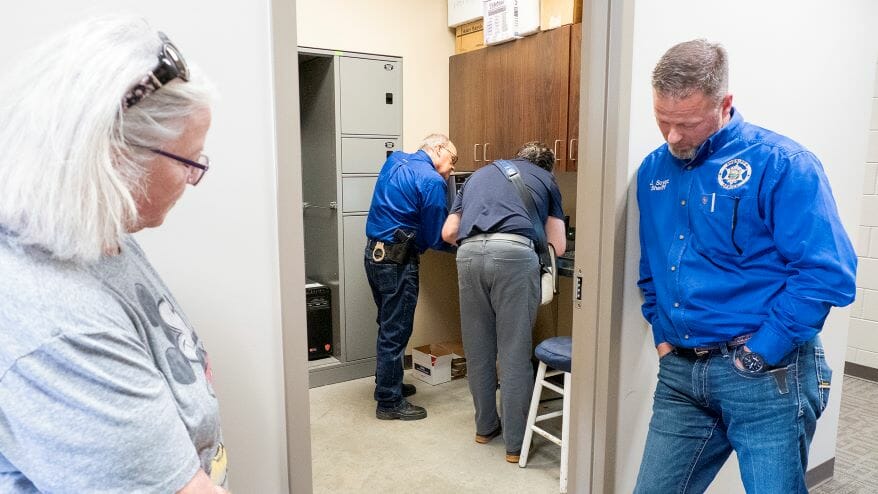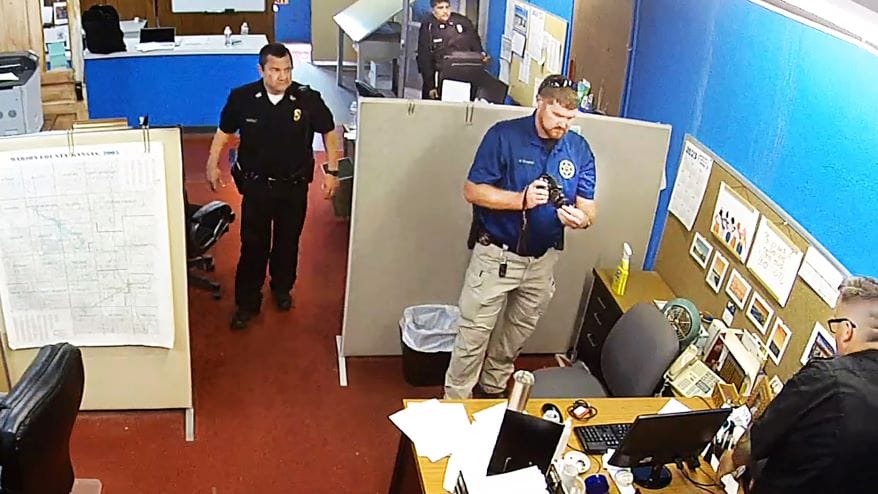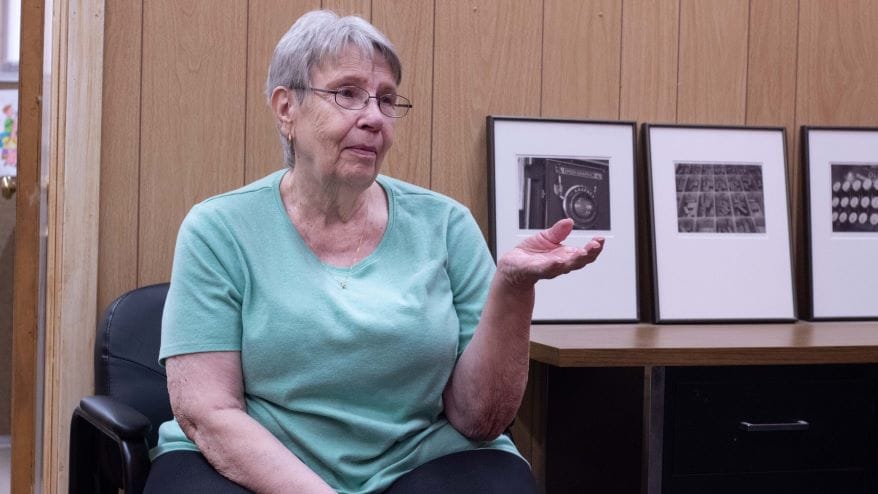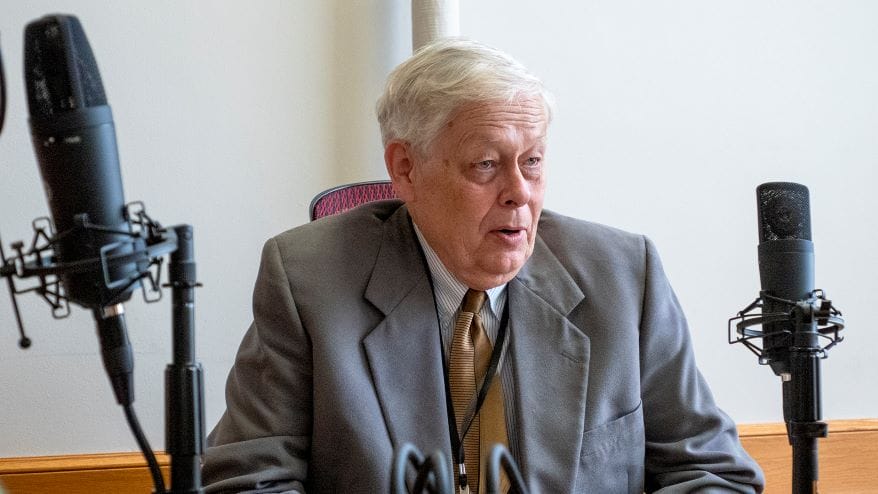Kansas Officials Downplayed Involvement in Marion Raid. Here’s What They Knew. Documents show unquestioning support before raid, followed by attempts to sidestep outrage
Published November 6th, 2023 at 11:15 AM
Above image credit: Marion County Record reporter Deb Gruver had the words “FREEDOM OF THE PRESS” tattooed on her arm. In her lawsuit, she accuses Police Chief Gideon Cody of “recklessly” violating her constitutional rights. (Submitted by Deb Gruver to Kansas Reflector)MARION, Kansas — Marion Police Chief Gideon Cody enlisted the support of local and state law enforcement officials in the days before he led raids on the local newspaper office, the publisher’s home and the home of a city councilwoman.
The Kansas Bureau of Investigation, Kansas Department of Revenue, Marion County Sheriff’s Office and the Office of the State Fire Marshal — along with the county attorney and a magistrate judge — were complicit in the Aug. 11 raid or knew it was imminent. But in the days that followed, they largely downplayed their involvement.
Police reports, internal agency emails and other documents obtained by Kansas Reflector provide a clearer picture of the raid than the early one that crystallized as a fast-moving story attracted international attention.
There was the restaurateur who wanted a liquor license. The reporter who looked up the restaurateur’s drunken driving record. The police chief who knew reporters were investigating his past misconduct. The newspaper publisher with his strident editorial voice, and the demise of his defiant 98-year-old mother.
We now know there was also a KBI agent and his supervisor who had advance copies of the search warrants. A sheriff’s detective who wrote the search warrants. Department of Revenue staff who treated the reporter’s actions as criminal. And a fire marshal’s investigator who participated in the raid even though he seemed to realize it was unlawful.
Then there was the county attorney who claimed he didn’t review the search warrant affidavits until after the raid, even though police had sent them to him for preapproval. And the magistrate judge, with her own checkered driving record, who signed three of the search warrants but refused a fourth.

Officers from three agencies converged Aug. 11 to seize personal cellphones, computers and other items from Marion County Record publisher Eric Meyer, two of his reporters — including one who wasn’t even a target in the investigation — and Councilwoman Ruth Herbel. Police also rummaged through a reporter’s desk drawer and Meyer’s paperwork to take stock of confidential sources.
There is no indication in any of the records obtained by Kansas Reflector that anybody anywhere suggested the raid would be a bad idea, despite federal protections for journalists and the flimsy pretext of a crime.
Katherine Jacobsen, U.S. and Canada program coordinator for the Committee to Protect Journalists, said it is incredibly concerning that so many taxpayer-funded agencies were willing to tacitly or directly sign off on a gross violation of the freedom of the press.
“I think the most charitable interpretation I can come up with is they just didn’t know and were ill informed about freedom of the press and the rights that journalists have in this country,” Jacobsen said. “A more nefarious interpretation is, of course, that they just didn’t care and were in fact kind of happy to see the journalists put in their place.”

Before and After
Marion County Record reporter Phyllis Zorn was exhausted Aug. 16 after staying up all night to publish the first edition of the newspaper since the raid five days earlier.
Scrutiny of the raid had intensified as the police chief and KBI director issued statements about journalists not being above the law — a distraction from the reality that if anyone had broken the law, it was the police. The newspaper’s 200-point bold type headline that morning read: “SEIZED … but not silenced.”
Cody, the police chief, had notified County Attorney Joel Ensey of his investigation in an Aug. 8 email, and sent copies of the search warrants to Ensey before taking them to a magistrate. A day after the raid, Ensey told Cody he would need to get a district court judge to sign the warrants so that the evidence seized during the raid could be reviewed by law enforcement outside of Marion.
“I also believe with the scrutiny this will receive, another judge reviewing the warrant would be a good idea, especially with some of the new information learned during the search,” Ensey said.
But as copies of the newspaper were being delivered around town on Aug. 16, and new subscribers streamed into the newspaper office, Ensey claimed he had reviewed the search warrants in detail on Aug. 14. He said there was insufficient evidence to support the raids and that items seized would be returned.

Zorn, wearing a Mickey Mouse T-shirt, leaned against the doorway to the sheriff’s office evidence locker, where a deputy was retrieving the electronic devices that police had collected and bagged during the raid. The reporter was listening to Sheriff Jeff Soyez assign blame to the police department.
“It’s not my search warrant,” Soyez said. “It was PD’s search warrant.”
He leaned in to say quietly in Zorn’s ear: “You didn’t see me over there.”
“No, I’m glad I didn’t,” she told him, “because as relaxed as it is between you and me, I probably would have said some things.”
In fact, it was one of Soyez’ officers, Detective Aaron Christner, who had advised Cody on Aug. 8 to get a search warrant to preserve emails. Christner then drafted the search warrants and sent them to Cody to modify and sign. During the raid, Christner used software to make a digital copy of files from Zorn’s computer, which police initially didn’t disclose on their evidence log.
Ensey and the sheriff weren’t the only ones offering a cop-out.
Anyone can access driving records legally through the Department of Revenue’s online database — if they have a name, date of birth, and driver’s license number. Marion resident Pam Maag on Aug. 2 sent Zorn and Herbel a copy of restaurateur Kari Newell’s driving record, which showed Newell had a DUI and had been driving without a license. Zorn used KDOR’s website to verify the record.
According to Marion police officer Zach Hudlin’s written summary of an Aug. 7 phone call, an unnamed employee in KDOR’s IT department told him “there was a loophole or a vulnerability in their system that would allow someone to access another person’s private data.” The IT staffer confirmed that Zorn had looked up Newell’s driving record on Aug. 4.

Emails exchanged among Chad Burr, with KDOR’s Office of Special Investigations; Garrett Kaufman, technical services manager at KDOR; Craig Bowser, with the Office of Information Technology Services; Desiree Perry, a cyber intelligence specialist; and Valerie Pitts, IT manager at KDOR, show the agency treated Zorn’s use of the website as a crime. Kaufman said it was good that police were working with the KBI.
KDOR didn’t respond to an email asking why the agency’s perspective changed in the days after the raid.
On Aug. 21, KDOR spokesman Zach Denney told the Kansas City Star that “this information is public record and available online.” He told NBC News “the motor vehicle driver’s checker is public-facing and free-use.”
Cody emailed KBI special agent Todd Leeds on Aug. 8 and asked for assistance. Leeds forwarded the request to his supervisor, special agent in charge Bethanie Popejoy, then opened a case on “Marion Public Corruption.”
Leeds asked police for cellphone numbers, Facebook account names and email addresses for Newell, Meyer, Herbel, Zorn and Maag. The KBI agent also wanted Newell’s witness statement and Herbel’s emails. Marion police sent Leeds “everything we have currently for the case.”
Hudlin sent copies of search warrants to Leeds on Aug. 10.
“Did you guys execute this today?” Leeds asked.
“No,” Hudlin replied. “My understanding is that the county attorney wasn’t in the office today.”
A day after the raid, Cody wrote to Popejoy at the KBI to notify her of the items police had gathered during the raid. He CC’d Ensey on the email.
“I cannot tell you how much I appreciate the KBI’s support,” Cody wrote. “It has been tough being the Chief of Police today.”
Two days after the raid, KBI director Toni Mattivi professed his belief in free speech while defending his agency’s involvement in the investigation and taking a jab at news media. Mattivi said his agent did not apply for the search warrants and wasn’t present during the raid.
Attorney General Kris Kobach, who has oversight of the KBI, told reporters on Aug. 16 that the KBI “was not notified of the searches prior to their taking place.”
The S***storm
Cody told the KBI that Magistrate Judge Laura Viar “scrutinized the evidence and decided it was not enough for me to get Pam Maag’s electronic devices.”
But Viar approved search warrants for the Marion County Record newsroom, Meyer’s home and Herbel’s home. The alleged crime was identity theft.
On the morning of Aug. 11, Marion police asked Chris Mercer, an investigator with the Office of the State Fire Marshal, to help with the raid.
Mercer agreed. He was briefed and assigned to Meyer’s house, according to the report he filed. He arrived at 10:55 a.m.
There, he secured Meyer’s cellphone and laptop and made Meyer leave a stack of paperwork on a table. Mercer told Meyer and his mother, Joan, the 98-year-old co-owner of the paper, they were free to leave.
From Mercer’s notes: “Eric home walking around with phone he’s upset, ‘we in s***storm,’ he says.”
Joan Meyer alternated between being calm and outraged, Mercer wrote. She called the judge stupid. Demanded police get out of her house. Called them Nazis.
She told Mercer she had previously suffered two strokes. If she has another, she said, that’s “going to be murder.”
“Joan crying and violent verbally, sitting in living room, Nazi comments, angry kicking walker,” Mercer wrote.
At one point, Mercer heard Eric Meyer talking to someone on the landline: “Cody has checkered past, and he will now have access to that information!”

The phone rang after Eric Meyer left to go to the newsroom, which was under siege. The caller was the author of this story. Joan Meyer answered, then handed the phone to a sheriff’s officer, who wasn’t interested in answering questions.
“Joan appears to be getting more confused,” Mercer wrote. She was crying and mumbling about corruption.
At the newsroom, police read reporters Zorn and Deb Gruver their Miranda rights. Gruver, who wasn’t named in any of the search warrant affidavits, told Cody she didn’t have anything to do with Newell’s driving record. Cody ripped her personal cellphone from her hand.
Surveillance video shows Hudlin uncovered a file in Gruver’s desk drawer and encouraged the police chief to take a look, the Marion County Record reported.
“Hmm,” Cody said. “Keeping a personal file on me. I don’t care.”
The first page in the folder revealed a confidential source who had provided information about Cody’s time on the Kansas City, Missouri, police force. A half-dozen of Cody’s former coworkers had told Gruver that Cody faced demotion for sexual harassment before taking the Marion job in April.

When police arrived at Herbel’s house, she was in the bathroom. Her husband, who suffers from dementia, ran in a circle through the house trying to find her. He went to the backyard and screamed her name. She sat him down on the couch to try to calm him.
The councilwoman’s supposed crime involved forwarding Newell’s driving record to the city manager and raising concerns about whether the city council should grant Newell a liquor license. A political adversary, Mayor David Mayfield, had tried and failed to remove Herbel from office before. A felony crime would disqualify her from public service.
Police took her cellphone and computer during the raid, leaving her without a way to call for medical help if her husband needed it. She had to drive 35 miles to a town where she could buy a new phone.
Herbel’s husband ended up staying on the couch for more than three hours. Following the raid, she has taken him to the doctor several times because of his declining health.
“I will never forgive this police force or the sheriff’s office or the county attorney or anybody else for what they did to him,” Herbel said. “I mean, they can kick an old lady — and I’d say I’m an old lady because I’m 80 years old. And I can’t run that fast either. But they don’t do that to my husband. He’s 88, and I just felt that this shortened his lifespan tremendously when they did this, and I’ll have hard feelings against them all.”

Federal Protections
By Mercer’s own account, he made sure city police went through the stack of paperwork he required Eric Meyer to leave behind.
Meanwhile, Mercer wrote, Joan Meyer was “yelling not to touch her stuff, calling us a**holes.”
She hoped officers would fall down the stairs and break their necks. She threw her walker.
“The team left and I was the last one out of the front door, while she sat in her recliner continuing to yell at us,” Mercer wrote. “She mentioned something about shoot if we come back, but I disregarded it as a I walked out the door.”

Joan Meyer died the next day. The coroner said the stress of the raid was a contributing factor.
Mercer’s report is dated Aug. 11, the day of the raid. Attached to it is a three-page article written by media law attorneys Jonathan E. Buchan and Corby Anderson in 2001.
The article — “When the police knock at your door: Newsroom search warrants” — is about the federal Privacy Protection Act, which requires criminal investigators to get a subpoena instead of a search warrant. Congress passed the law to address concerns about police weaponizing search warrants against journalists.
Journalists “feared that the magistrates who issued warrants for these searches, often political allies of law enforcement officials, would be biased in deciding whether there was probable cause to justify issuing a warrant,” the attorneys wrote. “In addition, they feared that such searches would physically disrupt the newsroom and its operations.”
A spokeswoman for the Office of the State Fire Marshal didn’t respond to questions for this story about why the legal memo is attached to Mercer’s report, or why he agreed to join an unlawful raid.
Max Kautsch, president of the Kansas Coalition for Open Government, said the reference to federal protections attached to Mercer’s report “goes a long way to show that the decision-makers at the state and local levels involved with authorizing and executing the searches knew or should have known the searches were contrary to clearly established law.”

A Convenient Excuse
Four days after the raid, Marion Councilman Zach Collett emailed the League of Kansas Municipalities. He was “beginning to wonder if it would be beneficial to our community to have a council member grant an interview request?”
“I would be comfortable doing this, but would most definitely want lots of coaching from someone more versed in crisis communication than myself,” Collett wrote. “I was wondering if the League offers any services like that? I am still unsure of the best route forward, but I am tired of our community being portrayed the way (it) is in a national headline currently.”
Nathan Eberline, executive director of the League of Municipalities, referred Collett to two firms that focus on crisis communications and pointed him to a YouTube webinar on the topic.
“Given the weight of the media focus, I agree that it would be prudent to speak with an expert,” Eberline said.
Eric Meyer said nobody in Marion, including himself, wanted this kind of publicity.
“I mean, we’ve become the laughingstock of the free world, really, in terms of we’ve got these Keystone Cops and the judge who doesn’t know anything and had drunk driving arrests, and prosecutors who can’t take time to read stuff, and city council members who don’t answer questions,” Meyer said.
In the weeks that followed, ethics complaints were filed against Ensey and Viar. Gruver left the newspaper and filed a civil lawsuit against Cody in federal court. Cody resigned after KSHB reported he had instructed Newell to delete text messages between them. Hudlin is now the interim police chief. Herbel is up for re-election Tuesday.
Melissa Underwood, spokeswoman for the KBI, said the agency’s investigation “remains ongoing.”
“We expect to be able to update on the case soon,” Underwood said. “At that time we should be able to answer some additional questions.”
Meyer believes the raid was orchestrated by local figures who wanted to bully him.
“And for what? So we got Kari Newell’s driving record,” Meyer said. “This isn’t a big drug deal. This isn’t embezzlement.”
The newspaper’s website recently was subjected to a malware attack, Meyer said.
“That’s probably a more serious crime than what we were accused of — particularly since when all this was said and done, nobody did anything about it,” Meyer said. “And we told them what we’d done. So what crime existed? No, they just saw this as a convenient excuse.”
This story first appeared on the Kansas Reflector, a nonprofit news operation covering Kansas state government and politics that is part of States Newsroom. Sherman Smith is editor of the Reflector.



